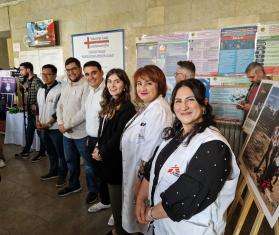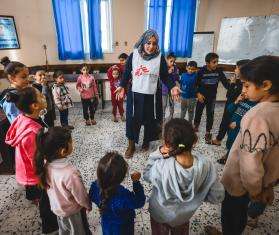Development of Simple and Rapid Diagnostic Tools Key for Fighting Tuberculosis
Geneva/New York, Tuesday March 22, 2005 – Without a simple, rapid test for detecting tuberculosis (TB), care providers in developing countries will continue to miss about half of all the people who need tuberculosis treatment. Efforts to control TB globally will be undermined, said the medical humanitarian organization Doctors Without Borders/Médecins Sans Frontières (MSF).
"I am sick and tired of watching TB kill my patients. It often feels as though I practice medicine with my hands tied behind my back. Since I have to use a 19th–century diagnostic tool that is wrong more times than not, it is like being blindfolded as well," said Dr. Martha Bedelu, an MSF physician working in South Africa.
Diagnosing TB in developing countries still relies on sputum microscopy, a diagnostic method that was developed 123 years ago. It only detects TB bacilli in 45-60% of all people who have TB, and is even less effective for those who have both HIV and TB – over 30% of the nearly 40 million people living with HIV/AIDS globally. "In the era of the HIV/AIDS pandemic, this is untenable: TB is the number one killer of people with HIV/AIDS. What's more, the test doesn't work at all in children," said Dr. Bedelu.
Nearly nine million people develop TB disease every year, and the vast majority of them live in developing countries, where 99% of all TB deaths occur and where 90% of all people living with HIV/AIDS live. Yet most existing efforts to develop more effective TB tests are technology-driven and focus on the more lucrative Western markets.
"MSF is committed to participating in the development of new tests by assessing the feasibility of new technology in our field projects. But we fear that current product development is not going to result in an easy-to-use rapid method of diagnosing TB in all patients," said Dr Francine Matthys, TB advisor for MSF's Campaign for Access to Essential Medicines. "We need something similar to what our teams now use for malaria: a simple test which yields results almost instantly and can be used by any laboratory technician, nurse or health workers even when far away from a laboratory."
MSF is well aware of the challenges of TB diagnosis and has been working with experts to see how the development of diagnostic tests adapted to the needs of patients and health personnel in developing countries could be accelerated.
"We need a lot more investment and interest in basic science that looks at completely new ways of diagnosing TB," said Dr Matthys. "Research and product development intended to simplify and reduce the cost of existing diagnostic techniques and other more rapid, simple, sensitive and specific methods must be supported."
MSF is upgrading the laboratory facilities it uses by enhanced microscopy, and improving diagnostic and follow-up of treatment with culture, X-rays, drug sensitivity testing and training of local staff. "But the longer it takes to introduce a truly useful and simple tool for detecting TB, the bigger the number of people dying of TB without ever having had a chance to know what killed them," Dr Francine Matthys said.
MSF treats TB patients in nearly 50 projects in 24 countries worldwide. 16,500 TB patients were admitted in MSF projects in 2004 and many more were diagnosed by MSF and referred to national TB programs. MSF advocates for improved TB care and more research and development into better TB vaccines, diagnostic tests, and treatments.



